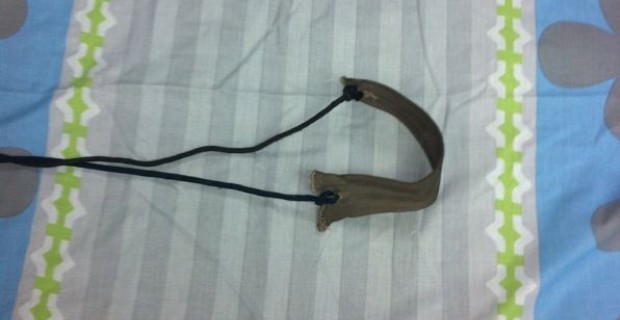Following the killing of Mustafa Tamimi in his village Nabi Saleh, Spokesperson for the IDF presented pictures of a slingshot Tamimi had on him when he was brought to the hospital. This was to be the indicting evidence that the protester was taking part in hostile action against the army – i.e. throwing stones – and therefore responsible for his own death.
Only in the context of the occupation can throwing stones at a bullet-proof army jeep be seen as an offense deserving the death penalty, carried out on the spot (clearly, the soldiers weren’t acting in self-defense). Furthermore, as recent attacks by settlers on soldiers – including a brick thrown from close range on the IDF regional commander – demonstrated, the army’s treatment of Jews is very different (to be clear, I don’t call for shooting Jewish stone-throwers either). But there is a larger issue here, concerning the whole notion of “legitimate” resistance to the occupation.
Facts and context are important: Israel took over the West Bank and Gaza more than 44 years ago. Since then, the Palestinians have been under military occupation, which denies their basic human and civil rights. The Palestinians can’t vote. They are tried in military court, where the conviction rate is astonishing. They don’t enjoy due process. Their property rights are limited, and their lands – including private lands – are regularly seized by Israel. All this is well-known and well-documented.
As far as Israel is concerned, this situation can go on forever. Israel is not attempting to leave the West Bank – it actually strengthens its hold on the territory – and it doesn’t plan to give the Palestinians equal rights within the state of Israel.
The Palestinians therefore have a moral right to resist the occupation. It’s as simple as that.
——————
Asked how what form of protest against the occupation Israel can allow, Peter Lerner of the IDF spokesperson unit wrote this tweet:
To start, this is simply a lie. Israel doesn’t allow any form of protest in the West Bank (well, except for settler protest). Military law demands IDF permission for any demonstration of more than 10 people. The IDF regularly declares the villages of Nabi Saleh, Bil’in and Ni’lin, where protests take place, as Closed Military Zones, and it charges Israelis who attempt to join those demonstrations with violating of this order. Palestinian protest organizers are tried for long prison terms in military courts.
But more important, the kinds of protest Major Lerner is suggesting are effective under civilian authority, not under military control. Major Lerner is part of Israel’s media war for the hearts and minds of Westerners, and the answer he gives is something that people in democracies can identify with. But this is not the situation in the occupied territories: For all Israel cares the Palestinians can have sit-ins and rallies until second coming; it wouldn’t affect Israeli policy one bit. It is worth remembering that in the two decades following 1967, strikes, rallies and general assemblies were the main protest methods in the West Bank and Gaza. Israel used these years of relative calm to introduce its massive settlement project. The only thing that made Israelis notice the Palestinians and start seriously discussing their rights is the the first Intifada.
In recent years, it seems that the West’s favorite sport is to tell the Palestinians what constitutes a “legitimate” way to fight for their rights, and what doesn’t – as if the Palestinians were full members of society and not subject to a form of control that Amira Hass rightly calls “Israeli dictatorship.” Nobody would denounce Egyptian or Tibetan protesters for such acts, but reports of unarmed Palestinian resistance are usually met with Israel claiming evidence of Palestinian “violence” – mostly stones thrown at soldiers, with the occasional Molotov cocktail. As if those could justify the occupation, while in reality they are the reaction to it.
The same goes for those organizations and Israeli propaganda units specializing in the hunt for “Palestinian incitement.” Any suggestions of the Palestinians not viewing IDF soldiers in a positive light is presented as proof of the fact that “they are not ready” to enjoy their rights to justice, freedom and dignity – as if those are someone’s to give. What is the meaning of the word “rights,” if they can be denied collectively for half a century? Is freedom a trophy you need to win from your oppressor? What do people expect of a prisoner to think of his or her guards? Good relations and understanding can be built after the resolution of the occupation – not in the midst of it. Yet Palestinians are expected by the world not only to live under Israeli military control, but also to like Israelis.
Strange as it may seem, even critics of Israel repeat such demands, or ask, “Where is the Palestinian Gandhi?,” as though a failure to present one means that Palestinian demands are not to be taken seriously.
By the way, the Palestinians have their share of Gandhis – you can find them in Israeli prisons.
I oppose violence, in whatever form. More than anything, I oppose violence against civilians. I think that the Palestinian choice of unarmed resistance and of civil society campaigns against the occupation is both wise and heroic. But the real violence is the occupation, and all its victims are civilians.
It is not for Israel to tell Palestinians how to resist our occupation.



